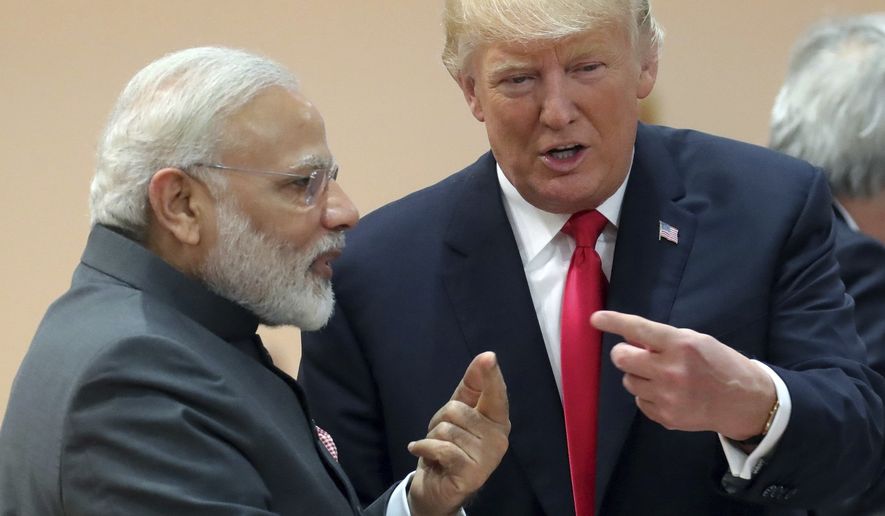OPINION:
Narendra Modi’s state visit to Israel from July 4 to 6 was as pathbreaking as it was symbolic.
Not only was his visit the first by an Indian prime minister to Israel since its creation in 1948 and also commemorated the 25th anniversary of bilateral diplomatic relations, it clearly delinked Palestine from India’s equations with the Jewish state even while elevating New Delhi’s ties with Tel Aviv to a “strategic partnership.”
Mr. Modi had reassured visiting Palestinian President Mahmoud Abbas in New Delhi in May that India’s ties with Israel will in no way impinge on its relationship with the state of Palestine. There has, nevertheless, been a clear diplomatic tilt toward Tel Aviv. Mr. Modi’s right-wing Bharatiya Janata Party-led government has for the last three successive years abstained from a U.N. resolution condemning Israel for its alleged war crimes during the 2014 Gaza offensive.
The fulsome protocol-breaking welcome Mr. Modi received in Israel reaffirmed not only the ready rapport he enjoys with his counterpart, Benjamin Netanyahu, but laid the foundations for an abiding alliance between the two vastly disparate countries and upheld their desire to work closely together.
Israel is a sliver of a country of 8.4 million that emerged seven decades ago in a sand-strewn terrain engulfed by a hostile neighborhood that has precipitated eight wars alongside an ominous deadlock with the Palestinians. Subcontinental India is flanked by adversarial Pakistan and its ally China and has, since its independence from the British in 1947, waged war with Pakistan in 1947, 1965, 1971 and 1999, and in 1962 with China. It continues to suffer cross-border terrorism from Pakistan and subversion from Beijing that has assumed a bellicose situation at present.
Mr. Modi’s visit also deepened the two-way commercial links, with the signing by Indian and Israeli companies of a dozen investment agreements worth $4.3 billion at the maiden CEO Forum meeting in Tel Aviv. There was also a consensus that the current trade volume has the potential to reach $20 billion in the next five years.
Curiously, despite the talk of an equal and strategic partnership, Israel — with a size and population about 0.6 percent of India’s — has remained far the senior of the two sides. Even discounting its $1 billion worth of average yearly military sales to India, it enjoys a trade surplus, exporting goods worth $2.4 billion to India, while importing only $1.76 billion of merchandise in the bilateral trade of $4.16 billion for 2016. Measuring 8,000 square miles, Israel is about as big, or small, as Mizoram, one of India’s 29 states. Its gross domestic product (GDP) of $297 billion is overshadowed by India’s $2.25 trillion, but more than makes up with a GDP per capita of $34,800 to India’s $6,700.
As with his visit to the United States in June, Mr. Modi avoided announcing any defense programs during his Israeli visit so as not to detract from the other bilateral deals that were concluded. The United States and Israel, together with Russia and France, are the largest suppliers of military equipment to India, which is, incidentally, the world’s largest arms purchaser. India is also Israel’s biggest arms market, having purchased 41 percent of its export between 2012 and 2016, according to global arms research agency Stockholm International Peace Research Institute.
However, announcements of major defense deals with both Israel and the United States are expected at a later stage, with a record value of deals being finalized with Israel in the current year. These may include the nearly $1 billion purchase of 8,000 Spike, fourth-generation, anti-tank guided missiles, developed and designed by Rafael Advanced Defense Systems, a sale originally estimated at $525 million when first proposed in 2014. Other contracts include $1 billion for two additional Phalcon Airborne Early Warning and Control Systems (AWACS) — the Indian Air Force already flies three of these — from Israel Aerospace Industries (IAI), and a $400 million purchase of 10 weaponized Heron TP unmanned air vehicles.
Israel also netted its largest ever defense contract when IAI was awarded contracts totaling almost $2 billion by India in April. IAI will supply the Indian Army with medium-range, surface-to-air missile defense systems and additionally, a long-range surface-to-air missile defense system for India’s first indigenous aircraft carrier, Vikrant.
While both countries are proceeding beyond this vendor-buyer relationship by promoting joint ventures in India for customized design and production, Israel has been lending its technologies and know-how to India’s critical sectors like food security, water management and efficiency, space, cyberspace and data protection, e-learning and innovation, and digitalization.
Mr. Modi emphasized, “Our goal is to build a relationship that reflects our shared priorities and draws on enduring bonds between our peoples.”
• Sarosh Bana is executive editor of Business India.




Please read our comment policy before commenting.